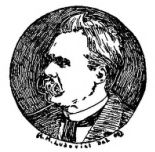
THE GENEALOGY OF MORALS
A POLEMIC
BY
FRIEDRICH NIETZSCHE
TRANSLATED BY
HORACE B. SAMUEL, M.A.
PEOPLES AND COUNTRIES (FRAGMENT)
TRANSLATED BY J. M. KENNEDY

The Complete Works of Friedrich Nietzsche
The First Complete and Authorised English Translation
Edited by Dr Oscar Levy
Volume Eight
T.N. FOULIS
13 & 15 FREDERICK STREET
EDINBURGH: AND LONDON
1913
CONTENTS.
PREFACE.
FIRST ESSAY. "GOOD AND EVIL," "GOOD AND BAD."
SECOND ESSAY. "GUILT," "BAD CONSCIENCE," AND THE LIKE.
THIRD ESSAY.
PEOPLES AND COUNTRIES. Translated by J. M. KENNEDY.
EDITOR'S NOTE.
In 1887, with the view of amplifying and completing certain newdoctrines which he had merely sketched in Beyond Good and Evil(see especially aphorism 260), Nietzsche published The Genealogy ofMorals. This work is perhaps the least aphoristic, in form, of allNietzsche's productions. For analytical power, more especially in thoseparts where Nietzsche examines the ascetic ideal, The Genealogy ofMorals is unequalled by any other of his works; and, in the lightwhich it throws upon the attitude of the ecclesiast to the man ofresentment and misfortune, it is one of the most valuable contributionsto sacerdotal psychology.
PREFACE.
1.
We are unknown, we knowers, ourselves to ourselves: this has its owngood reason. We have never searched for ourselves—how should it thencome to pass, that we should ever find ourselves? Rightly has it beensaid: "Where your treasure is, there will your heart be also." Ourtreasure is there, where stand the hives of our knowledge. It is tothose hives that we are always striving; as born creatures of flight,and as the honey-gatherers of the spirit, we care really in our heartsonly for one thing—to bring something "home to the hive!"
As far as the rest of life with its so-called "experiences" isconcerned, which of us has even sufficient serious interest? orsufficient time? In our dealings with such points of life, we are, Ifear, never properly to the point; to be precise, our heart is notthere, and certainly not our ear. Rather like one who, delightingin a divine distraction, or sunken in the seas of his own soul, inwhose ear the clock has just thundered with all its force its twelvestrokes of noon, suddenly wakes up, and asks himself, "What has inpoint of fact just struck?" so do we at times rub afterwards, as itwere, our[Pg 2] puzzled ears, and ask in complete astonishment and completeembarrassment, "Through what have we in point of fact just lived?"further, "Who are we in point of fact?" and count, after they havestruck, as I have explained, all the twelve throbbing beats of theclock of our experience, of our life, of our being—ah!—and countwrong in the endeavour. Of necessity we remain strangers to ourselves,